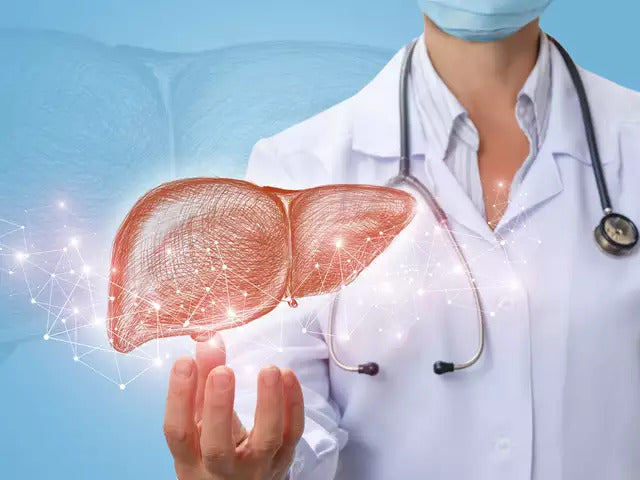Protecting Your Liver

By Dr. Richard Amerling, MD
Chief Academic Officer of The Wellness Company
The liver is the largest solid organ in the body, and essential for life. Located just below the right lung/diaphragm and extending across the midline it is a major detoxification and synthetic factory.
Along with the kidneys, it’s responsible for the removal of thousands of toxic substances (i.e., medications) and synthesis of dozens of crucial substances, such as cholesterol, lipoproteins, albumin, and various clotting factors. The liver also produces bile salts which are injected into the intestine to aid in digestion of fats.
Toxins are also eliminated this way. Physicians in the 18th century ascribed diseases to accumulation of different “humors,” such as “black bile,” or melancholia.
Liver failure is fatal; transplantation is the only current remedy (though several “liver dialysis” systems offer short term relief) and this is, to say the least, a major undertaking with considerable risk. Far better to keep your own liver safe and healthy!
The liver has a double circulation, receiving blood directly from the gastrointestinal tract via the portal vein, and oxygenated blood from the hepatic artery. The portal circulation is vital for detoxification of ingested substances and processing of nutrients. The pancreas delivers insulin via this route, which tends to keep circulating insulin levels low. Insulin administered via injection bypasses this and creates hyperinsulinemia.
Liver architecture is complex and essential for its proper function. Repeated insults to the liver disrupt this by creating fibrosis, i.e. scarring, which we call cirrhosis. Cirrhosis leads to shunting of blood from the portal to the systemic circulation, which can cause brain dysfunction (hepatic encephalopathy).
Fortunately, the liver has legendary ability to regenerate, known since antiquity. Prometheus’ punishment for giving Man fire was to be chained to a rock so raptors could eat his liver by day, only to have it regrow overnight.
A major symptom of liver disease is jaundice—a yellow discoloration of skin and sclera—caused by accumulation of bilirubin, produced by breakdown of hemoglobin. Subclinical liver injury or inflammation can be detected by blood tests (transaminases, LDH, bilirubin).
There are rare congenital disorders affecting the liver, but most liver diseases result from either infections (hepatitis A, B, C, etc.), autoimmune disease, or toxic substances. The vast majority of liver problems are preventable! Hepatitis A is usually acquired through contaminated food, but is rarely severe and almost always transient.
Hepatitis B is transmitted via blood or intimate contact and can be severe or chronic. It was endemic in dialysis patients and personnel until the development of an effective vaccine in the 1990s. Hepatitis C produces chronic, smoldering disease leading to cirrhosis over many years, and/or cancer. Effective antiviral treatments for hep C have been available for several years.
There is a long list of medications known to adversely affect the liver. High on that list is acetaminophen, aka, Tylenol. Overdosing with acetaminophen can cause life-threatening acute liver failure. Many antibiotics, statins, and anti-seizure medications are on the list. Thus, a very good way to keep your liver healthy is to avoid unnecessary medications. This is one of our principal strategies at The Wellness Company.
The two major causes of chronic liver disease are, by far, alcohol and fructose. Alcohol is acutely hepatotoxic and can cause severe hepatitis, and even liver failure. Chronic alcohol ingestion is the leading cause of cirrhosis. Fructose (roughly 50% of table sugar) is entirely metabolized in the liver to fatty acids, which then can accumulate and cause fatty liver, a precursor to cirrhosis. Thus, avoiding or limiting exposure to these toxins is the most effective way to protect your liver. The amount of fructose in whole fruits isn’t a concern, though we discourage overconsumption of fruit, and suggest avoiding fruit juices entirely. High fructose corn syrup has largely replaced cane sugar as a sweetener and is added to numerous processed foods, including ketchup! Read labels and shop wisely.
Regarding alcohol, we recommend limiting alcohol intake to a glass of wine or beer with dinner, or similar. Daily alcohol consumption suggests habitual use which can lead to alcoholism; the same goes for solitary drinking, daytime use, and non-meal related intake.
Become a Freedom from Pharma Member
- - - - - - - - - - - - - - - - - - - - - - - - - - - - - - - - - -
About the Author:
Dr. Richard Amerling is a consultant Nephrologist/Internist with over 30 years experience. He specializes in diseases of the kidney, metabolic syndrome, diabetes mellitus, and hypertension. He is on the Chief Medical Board of The Wellness Company founded in 2022.
His areas of specialty include:
- Dialysis, including peritoneal and home dialysis
- Chronic kidney disease
- Metabolic syndrome
- Transplantation
- Metabolic bone disease
- Guideline critiques
- Health care economics and politics




